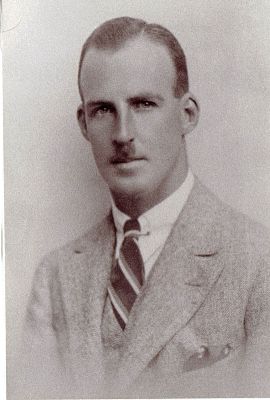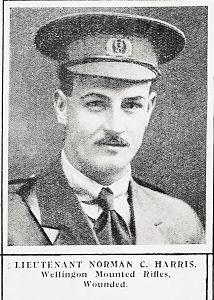WW1 William Strachan Chambers Harris
Strachan (as he was known) was born in Christchurch on 22 February 1895 to Bessie Caroline Emily and George Harris, one of six sons and four daughters.
His paternal grandfather Archdeacon William Chambers Harris had emigrated from England to be the third head of Christ’s College.
Strachan was a law clerk with Lane Neave in Christchurch when he enlisted on 8th March 1916. He left on the S.S. Aparima from Wellington as a corporal with the 16th Reinforcements of the New Zealand Field Artillery. After training at Aldershot as a Bombardier, Strachan proceeded to Rouen in France with the 5th Battery as a Gunner. He had further training in November 1917 at the 15th Corps Gas School set up in the field but was gassed and wounded in April 1918. Strachan was affected by the mustard gas on or about 25 April 1918. Mustard gas was sulphurous and could smell like mustard or onions, hence its name – it had a serious permanent effect on skin and eyes and the respiratory system. He was admitted to the 55 General Hospital in Boulogne and then transferred through St Denis to England where he entered the N Z General Hospital 2 at Walton in January 1919. His recovery was slow and he did not return to New Zealand until late 1919 on the R.M.S. Remuera, disembarking in Wellington on 28 October 1919.
Strachan moved to Auckland and met Joyce Mary O’Halloran and they were married in St Mark’s Church Remuera in 1935. He died from an accident in 1952. It seems highly likely that he never completely recovered from the gas attack.
Their son Garth Strachan Harris was born in 1936 and later their daughter Jill Mary Strachan Harris.
Three of Strachan’s brothers – Norman Chambers Harris, Frank Chambers Harris and Peter Chambers Harris also served overseas in World War 1. The eldest brother Norman left New Zealand on 14 December 1914 on the Verdala as a lieutenant in the Wellington Mounted Rifles (2nd Reinforcements) and died at Chunuk Bair on the Gallipoli peninsula on 9 August 1915. Peter left New Zealand in November 1917 on the troop ship Maunganui as a Gunner in the N Z Field Artillery, served in France and returned home in September 1919. Frank who trained as an airman at the Canterbury Flying School enlisted in the UK and served in the RAF. Their father George had died of a heart attack on Christmas Eve 1914, aged 47.

